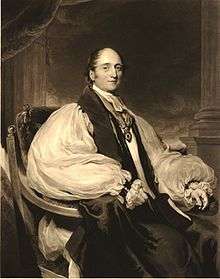Lord John Beresford
| The Most Reverend Lord John Beresford | |
|---|---|
| Archbishop of Armagh, Primate of All Ireland | |
 | |
| See | Armagh |
| Installed | 1822 |
| Term ended | 1862 |
| Predecessor | William Stuart |
| Successor | Marcus Beresford |
| Other posts |
Bishop of Cork and Ross Bishop of Raphoe Bishop of Clogher Archbishop of Dublin |
| Personal details | |
| Born | 22 November 1773 |
| Died | 18 July 1862 (aged 88) |
| Nationality | English |
| Denomination | Church of Ireland |
| Education | Eton College |
| Alma mater | Christ Church, Oxford |
Lord John George de la Poer Beresford PC (22 November 1773 – 18 July 1862)[1] was an Anglican archbishop and Primate.
Background
Born at Tyrone House, Dublin, he was the second surviving son of George de La Poer Beresford, 1st Marquess of Waterford[2] and his wife Elizabeth, only daughter of Henry Monck and maternal granddaughter of Henry Bentinck, 1st Duke of Portland.[3] He attended Eton College and Christ Church, Oxford, where he graduated with a Bachelor of Arts in 1793 and a Master of Arts three years later.[3]
Career
Beresford was ordained a priest in 1797 and began his ecclesiastical career with incumbencies at Clonegal and Newtownlennan.[4] In 1799 he became Dean of Clogher; and was raised to the episcopate as Bishop of Cork and Ross in 1805. He was translated becoming Bishop of Raphoe two years later and was appointed 90th Bishop of Clogher in 1819.[3] Beresford was consecrated Archbishop of Dublin in the next year and was sworn of the Privy Council of Ireland.[3] In 1822, he went on to be the 106th Archbishop of Armagh and therefore also Primate of All Ireland.[3] He became Prelate of the Order of St Patrick and Lord Almoner of Ireland.[3] Having been vice-chancellor from 1829, he was appointed the 15th Chancellor of the University of Dublin in 1851, a post he held until his death in 1862.[3]
Restoration of St Patrick's Cathedral
Beresford employed Lewis Nockalls Cottingham, one of the most skilled architects at that time to restore Armagh's St Patrick's Cathedral. Cottingham removed the old stunted spire and shored up the belfry stages while he re-built the piers and arches under it. The arcade walls which had fallen away as much as 21 inches from the perpendicular on the south side and 7 inches on the North side, were straightened by means of heated irons, and the clerestory windows which had long been concealed, were opened out, and filled with tracery.
Beresford is unsympathetically represented by Montalembert with whom during his Tour of Ireland he had breakfast at Gurteen de la Poer.
Beresford died at Woburn, the home of his niece,[5]in the parish of Donaghadee;[6] and was buried in the cathedral.[7]
References
- ↑ National Archives
- ↑ The Peerage.com – Most Rev. John George de la Poer Beresford
- 1 2 3 4 5 6 7 Dod, Robert P. (1860). The Peerage, Baronetage and Knightage of Great Britain and Ireland. London, UK: Whitaker and Co. p. 92.
- ↑ " A Compendium of Irish Biography." Webb,A (Dublin: M. H. Gill & son. 1878)
- ↑ Donaghadee Parish
- ↑ Arthur H. Grant, ‘Beresford, Lord John George de la Poer (1773–1862)’, rev. Kenneth Milne, Oxford Dictionary of National Biography, Oxford University Press, 2004; online edn, Jan 2008 accessed 10 Aug 2015
- ↑ Find a Grave – Lord John George de la Poer Beresford
| Church of Ireland titles | ||
|---|---|---|
| Preceded by Thomas Stopford |
Bishop of Cork and Ross 1805–1807 |
Succeeded by Thomas St Lawrence |
| Preceded by James Hawkins |
Bishop of Raphoe 1807–1819 |
Succeeded by William Magee |
| Preceded by John Porter |
Bishop of Clogher 1819–1820 |
Succeeded by Percy Jocelyn |
| Preceded by Euseby Cleaver |
Archbishop of Dublin 1820–1822 |
Succeeded by William Magee |
| Preceded by William Stuart |
Archbishop of Armagh 1822–1862 |
Succeeded by Marcus Beresford |